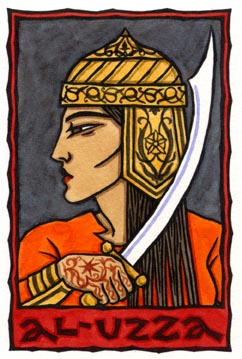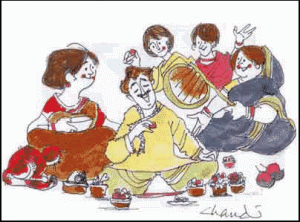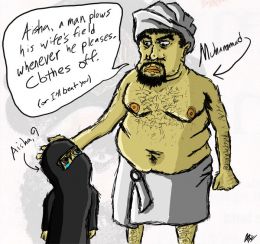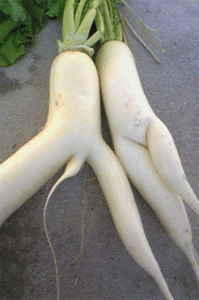‘…One of aunt Fajli ’s sons was also called Muhammad. He was her first son—before him had come his three older sisters—Humaira, Sufaira, Mubashwera. After having produced three girls in a row, aunt Fajli became prone to frequent possession by jinns, but after Muhammad was born the jinns began to leave her alone. However, Muhammad was then followed by three more girls. The jinns renewed their attack with greater force. Even Humaira, I heard, had been possessed a few days ago. In fact, this was quite a common occurrence in this house. Some young girl or another would be possessed almost every day. Amirullah had to be called in to get rid of the evil spirit, in a dark room, with all the doors and windows closed if there any.
I had once witnessed the whole procedure. The girl was called Juthi, in the same school as me, but one year my senior. She was a very pretty girl. One afternoon, she happened to be sitting under a banyan tree, singing quietly to herself. When the bell rang, all the other girls left but Juthi continued to sit there, singing. The bell rang again for the next class, but Juthi just went on singing, her hair blowing in the wind.
Our Urdu teacher—we called him Urdu Sir—was a priest. Informed about Juthi, he dragged her away from under the tree and told the other teachers that she had been possessed by a jinn . Juthi, by this time, was already shouting, “Let me go, let me go!” But, keeping a firm hold on her, Urdu sir began preparing for an exorcism. The first thing he did was take some holy water, mutter a few lines of prayer specific to the task, after which the water was sprinkled on Juthi’s face. But this was not all. Urdu Sir then set fire to one end of a branch from a neem tree, held it before Juthi, and beat her with a thicker branch. It didn’t stop until she fell over. I stood with all the other girls in the school and watched this spectacle, my eyes filled with boundless wonder. I felt very sorry for Juthi. Sitting in this room in Amirullah’s house now, I felt extremely uneasy. What if I was also possessed by a jinn ? What if Amirullah had to take me to a dark room, stick in hand, as he had done with all the others?
I shrivelled up with fear, so much so that I didn’t even notice the other girls moving away from the window. Ma came in briefly to tell me that she would return home as soon as the meeting was over. This brought me no comfort, for I had already had some experience about the length of Amirullah’s meetings. I knew the get-together would take place in a large hall. The girls would go straight from the inner part of the house, the portion of the hall that was curtained off. Everyone would have to sit on a mattress on the floor. Only Amirullah would sit on a divan, on a thick mattress. When he entered the hall filled with the scent of incense, his right hand would be raised, his face would be grave, and everyone would rise to their feet and say, “Salaam aleikum ya Rahamtullah.” The hall would echo with the sound of so many voices. Amirullah would reply in his deep voice, “Waleikum assalaam!” and make a gesture inviting his audience to sit down. The women—some smelling of talcum powder, some wearing kohl—would peer through a chink in the curtain to look at Amirullah and to cast sidelong glances at the other men.
The routine was the same today. Amirullah ran his fingers through his beard and began speaking: “Look, Abu Bakar, this world that we live in is an unreal world, so what’s the point of making a lot of money here? Will anyone ever be able to take it with him in the end? Tell me, will you take your possessions with you to your grave?”
Abu Bakar—short, with a dark beard, seated in the front row—replied, “No, Huzur.”
“So what will you give your heart to, eh? To Allah, or to the pursuit of wealth?” Amirullah addressed the question to Abu Bakar, but his glance swept over all the heads in the room, each covered with a white cap.
“To Allah, Huzur,” said Abu Bakar, sounding as if he had been hypnotized.
The women stared hard at Abu Bakar through the curtain. Today, his name would be on every one’s lips. Amirullah had spoken to him voluntarily. This was a rare honor for Abu Bakar. Some were of the view that Amirullah would now make a special recommendation to Allah to send Abu Bakar straight to heaven.
Each time the meeting lasted exactly an hour. This evening, Amirullah spent the time describing the poverty the Prophet had to suffer. His only possession was a torn blanket. The congregation wept noisily upon hearing how he had suffered. The more you cried in this house, the more you earned a good name. There was something else that earned one a good name too: having a dream. Aunt Fajli had dreamed she was sitting by the side of a fountain of Heaven with the Prophet Muhammad. Flocks of white birds were flying around, and a soft breeze was blowing. Although she couldn’t recall what they talked about, Amirullah had told her that a place in Heaven for her was now assured. After that, aunt Fajli had risen in everyone’s estimation. Some had asked her individually what the Prophet looked like, her face lit up as she described her dream: “His face is so bright, he is so handsome, how wonderfully soft his hands felt!” Her eyes closed slowly as she spoke, as if she could still feel the softness of his touch. They had moved to the fountain to take shower together and had only just started, when she woke up.
After hearing of her dream, various other members of the congregation began dreaming of the Prophet and were similarly hailed with words of praise. Ma felt profoundly unhappy that the Prophet had never appeared in her dreams. Before going to sleep she thought very hard about him, so that she might see him, but that didn’t happen. Ma considered herself a sinner.
As soon as the meeting was over, the men formed a queue to touch Amirullah’s feet and thrust money into his hands. The amount was unspecified. One was supposed to pay for Allah whatever one could. Those were Amirullah’s instruction.
Abu Bakar bent with deep reverence over Amirullah’s feet and said, “Huzur, I am very worried. The world is soon going to come to an end and we’ll all have to face the day of judgment. I no longer pay any attention to running my business. After all, when I go, I’ll go empty-handed, won’t I? Who knows what’s in store? All my life, I never really thought about this. Please pray for me, Huzur. Without your prayers and your blessings, I will be lost.”
Amirullah promised to pray and to bless.
Having collected the money from the men, Amirullah entered that section of the room where the women were sitting. Every woman not from his own family would now touch his feet and offer him money. After this was done Amirullah would retire, recline on his bed, and various young women would throw themselves at him to massage his body.
I pulled at Ma’s veil and said plaintively, “Come on, Ma, we must go home. If Baba gets back and finds me gone, he’s going to beat me!”
Ma snatched her veil my grasp. “Stop pestering me!” was all she said.
I stood alone in the dark courtyard, under the hibiscus bush. Somewhere, I had heard that a jinn was more likely to attack if you left your hair open, so I quickly covered my hair with my urna. I was not used to wearing long salwars and a urna, the garments older girls wore. At home, I still wore frocks, but here, in Amirullah’s house, your age didn’t matter. Unless your dress was approved by him, you were not allowed to pass through his front gate. It was an extraordinary new world, functioning within the familiar old one.
On our way back, as we began our ride in another rickshaw I asked Ma, “Why has Israfil been sitting for millions of years, holding a horn to his mouth? Why does Allah make him do that? I mean, He jolly well knows when the day of judgment is going to arrive, doesn’t He? Surely He could ask Israfil to pick up his horn and sound it when the time comes? Poor Israfil having to stay put, not moving an inch.”
Ma replied from under her burkha: “Allah is the Creator. Israfil is only an angel, so he has to obey the Creator’s command. Every angel must do that. Never question Allah’s will. Learn to be afraid of Him.”
“Your Huzur said we must give our hearts to Allah, learn to fall in love with Him. How can we love someone if we are afraid of him?”
I had always found it difficult to utter the words ‘fall in love’. There was an unwritten law that that particular phrase must never be used. But then, that law applied only to love between a man and a woman, because it was somehow wrong. People who fell in love were bad people. Aunt Jhunu , I knew, secretly loved someone. Dada wrote poetry with a girl called Anita in mind but that, too, was done secretly. “There was something between aunt Jhunu and uncle Rashu ,” Dada had once said. Even in my school, girls did not use the word “love.” They said “That girl over there has ‘something’ going on with a boy!” At first, I found it quite difficult to understand what “something” meant, but eventually I got into the habit of using it myself.
I did find that the word “love,” or even the phrase “falling in love,” could be used freely when referring to Allah. I had never heard anyone say, “Huzur has ‘something’ going on with Allah!” Humaira, it was rumored, had a love affair going on with her cousin, Atiq, but, it was always referred to as “something,” and the word was whispered. Yet, no one had any hesitation in saying that Humaira was deeply in love with Allah. In fact, it was always said very loudly so that every one could hear.
In answer to my question, Ma said briefly, “You can love Allah and be afraid of Him.”
“But you always say Allah keeps a record of every human being, when he’s to be born, when he’s to die, even who he’ll marry. Allah also knows who’ll go to Heaven and who’ll be sent to Hell. It’s all written down, all decided. Well then, this man Abu Bakar . . . if Allah has decided already to send him to Heaven, surely he’s not going to go to Hell even if he’s a sinner? And if you take me , , , if going to Hell is what’s already written for me, what’s the point of my praying to Allah? Is He going to change what He wrote down Himself?” I said all this in one breath.
“How come you behave as if you haven’t got a tongue in front of others? When you’re with me, you can’t stop chattering.” Ma said in a very cross tone.
“But, tell me, Allah is capable of doing anything, isn’t He?” I insisted, my voice trembling with curiosity.
“Yes. Allah can make anything happen. But if He does not want something to take place, then no power can work against His will. Not a single leaf on a tree would move unless Allah willed it.”
Ma’s body was covered from head to toe with a black burkha. Her face was hidden behind a thin, transparent veil that hung down from her forehead, so that her eyes were free to spot potholes before she stepped into them. Right now, the fury of her glance pierced the veil. I looked at her fiery eyes and said, “Suppose Allah was sitting with empty hands. Could he create a flower out of nothing?”
“Yes.”
“Suppose He had a hankie in His hand could He turn it into a pigeon?” I asked again.
“Certainly,” Ma said firmly.
“That man who came to do tricks in our school—that magician—he can do all those things too. He can even vanish into thin air and remain invisible, just like Allah!” I declared, triumphantly.
“What did you say? You’ve lost all your belief, all your virtue. You dare to compare a magician with Allah? You stupid girl! Is this why I take you with me to hear huzur’s speech? You’re much worse than you used to be! You are becoming a big Satan. I bet you’ve learned to talk like that from your father. I will sew up your lips, I swear, if you say such things just once more. In the face of such rage, I felt like a pricked ball. Ma had once told me that the saint Abdul Kader Jeelani, after being ordered by Allah, had emerged from his grave. I felt quite sure that if that magician was buried in a grave, he could come out, too. But I did not mention this to Ma, for I had no wish to hear more abuse. However,another question that was struggling to escape from my mind slipped out before I could stop it. “Why do people in your Huzur’s house keep getting possessed? Jinns don’t attack us, do they? You keep telling us Allah Himself comes down to visit that house. If that’s true, how come jinns dare to appear in Allah’s space?”
Ma dug her elbow into my stomach and gave me a sharp, painful nudge. “Shut up! Not another word, do you hear? When we get home, you must pray to Allah and beg His forgiveness. You’re not afraid of Allah, are you? No, of course not. How else would such Satanic thoughts get into your head?
I received no answer to my questions.
One day, I showed Ma my science book and asked, “Allah created Adam, didn’t He?”
“Yes.”
“But look at this!” I pointed at a early homosapian in my science book. “Here’s the first sign of life on earth.one cell grew to multiple. Ancient man evolved from a species of apes. Those men lived in caves, fought among themselves, ate raw meat etc. Then, much later, they learnt to light a fire. Then they made more progress, and gradually became civilised. The first man that Allah made – the prophet Hazrat Adam ,did he look like this hairy, naked ape , who walked in the garden of heaven?”
Ma wrinkled her nose, as if a bad stench was coming from the book, and said, “Get out of here, go! Every word written in that book is a lie. What Allah has said is the only truth. Nothing else matters.”
I had to come away. It was impossible to raise the matter with Baba, for invariably I lost my voice if I went anywhere near him. Who was right? Which was true — Allah or science? Who was going to tell me? There did not seem to be a great deal of reason in what Allah had said. ‘Reason’ was a word I had recently learnt. Baba had lately started saying, “Never act without reason. Ask your conscience before doing anything whether you should — or should not — do it. If the answer is yes, only then must you perform that task. Every human being has a conscience.
This particular speech was delivered — and repeated subsequently — when, during a game, I lit a match and accidentally dropped it in a heap of firewood. Luckily, there was no major disaster. Had the wood caught fire, and had it spread, Baba believed that the whole house would have been gutted.
There didn’t seem to be a great deal of reason in what Allah had said. What science said appeared far more reasonable. The first man was supposed to have been created by Allah and then simply dropped from heaven to land on earth with a loud thud. That sounded like a fairy-tale. If I mentioned this to Ma, she came back with, “If you say such bad things about Allah, your tongue will drop off.” To test this out, I sat in my room one day, with the door closed, and said Allah you are bad, you are ugly, you are rotten, you are a crook, you son of a bitch, you son of a pig . My tongue remained in place, it did not drop off. Now there was no doubt in my mind. Nothing happened if you abused Allah. Ma was quite wrong. I had learned something else. It was just not true that Allah would give you whatever you wanted. So many times after prayers, I had asked for chum chums, or snacks that I had seen uncle Sharaf and the others eat. I was never given anything. In my old school, Rajbari—the one that used to be a palace—I had seen a lovely, painted wooden horse and felt tempted enough to ask for one like it. No one gave me a wooden horse. There were various other things I had wanted. After what uncle Sharaf and uncle Aman did to me, I wanted them to get leprosy and die quickly. They neither got leprosy nor died. I had heard Ma say a similar prayer with regard to Baba. But he remained in perfect health and in fact seemed to be getting even fitter. He never had fever, not even for a single day. I, on the other hand, got frequent attacks of fever. It made me very happy, because I could stay away from school and studies. When I was ill, Baba spoke to me gently and stroked my head. It was only during these rare moments that it became easy to receive his affection. He bought bunches of grapes and oranges and placed them on my bed. I ate them all by myself, while my sister and brothers looked on. If they insisted that I share my fruit with them, I gave them just a little. Ma brought me pieces of salted ginger. But when it was time to take my medicines, the joy of being ill vanished quickly. Baba wanted me to swallow various pills and tablets every hour. Usually, I said, “Yes, I’ll take them,” and then threw each one out of the window when no one was looking.
Once, when my temperature did not come down even after a week, Baba got suspicious. He began bringing me my medicines himself. “Open your mouth,” he would say, pouring water into it and thrusting a capsule or tablet in. It invariably got stuck in my throat, which made me retch and throw up. Undaunted, Baba said “Open your mouth” as soon as I stopped vomiting. He didn’t give up until the capsule or tablet made a successful entry into my stomach.When Baba was not in the room, Ma came in, muttered suras, and blew on my chest. That felt quite nice. After all, someone’s soft breath on my chest had to be very different from a foul-tasting medicine. Then she brought me several glasses of pretty dirty water that was blessed by Amirullah, and she made me drink it. When I recovered, Ma claimed that it was her prayers and the holy water that had done it. Baba maintained it was his capsules…’
From ‘my girlhood’.











































































